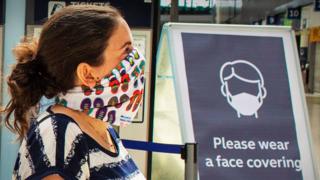 Image copyright
Alamy
Image copyright
Alamy
Wearing a face covering will become mandatory in shops and supermarkets in England from 24 July.
They are already compulsory in Scotland - but different rules apply across the UK.
What are the face coverings rules in shops?
It will be compulsory to wear a face covering in shops in England from Friday 24 July.
However, the rules won't apply to shop workers, government minister George Eustice told the BBC.
Those who fail to wear a mask will face a fine of up to £100. This will be reduced to £50 if people pay within 14 days.
The rules will be enforced by the police, rather than shop workers. The National Police Chiefs' Council says guidance will be issued to officers once the details of the new legislation are known.
People also won't be required to wear a covering in places where it's not practical - such as in a pub, cafe or restaurant - according to Mr Eustice. Children under 11 and those with certain disabilities will be exempt.
In Scotland, it's been a requirement to wear face coverings in shops since 10 July. Anyone not wearing one can be fined £60 fine (reduced to £30 if paid within 28 days) for a first offence.
People with certain medical conditions or disabilities, and children under five are exempt in Scotland.
What are the face covering rules on public transport?
Since 15 June, anyone travelling by bus, train, ferry or plane in England must wear a face covering.
Some passengers are exempt from the rules including:
Children under 11 People with disabilities Those with breathing difficulties Anyone travelling with someone who relies on lip readingIf it is "reasonably necessary" for you to eat or drink, you can remove the face covering to do so.
People can be refused travel if they don't follow the rules, and can be fined as a last resort.
Public transport excludes cruise ships, school transport, taxis and private hire vehicles. However, ride-sharing company Uber has made face coverings compulsory.
Image copyright Getty ImagesIn Scotland, it is also compulsory to wear face coverings on all public transport
Coverings will also be made mandatory on public transport in Wales from 27 July. These coverings should be three layers thick. It's also recommended that coverings are worn whenever social distancing is not possible.
The wearing of face coverings on most buses, trains and ferries became mandatory in Northern Ireland on 10 July.
Where am I supposed to get a face covering?
The government has been careful to use the term "face covering" rather than "face mask" - with surgical masks kept for medical use.
Image copyright Getty ImagesThe BBC has created a guide on how to make your own face covering. The government has issued its own advice too.
How many people wear face coverings?
There is a lot of variation around the world when it comes to wearing face coverings in public, according to polling company YouGov.
People in Asian countries are most likely to say they wear them. In Singapore, where it is an offence not to wear a mask outside your home, 90% of people do so - the highest rate in the world.
In Europe, the proportion of people wearing masks is highest in Spain (86%), followed by Italy (83%) and France (78%).
In the UK, just 36% of people say they wear a mask in public - although this has been steadily increasing.
In the US, the rate is 73%, which is slightly higher than its neighbour Canada (60%).
The data comes from surveys run in nearly 30 countries.
Do face coverings work?
World Health Organization (WHO) advice says non-medical face coverings should be worn in public where social distancing is not possible.
Coronavirus is spread when droplets are sprayed into the air when infected people talk, cough or sneeze. Those droplets can then fall on surfaces.
The WHO says there is also emerging evidence of airborne transmission of the virus, with tiny particles hanging in aerosol form in the air.
Homemade cloth face coverings can help reduce the spread from people who are contagious but have no symptoms or are yet to develop symptoms. This is called asymptomatic or presymptomatic transmission.
Scientists in Singapore suggest the contagion risk is especially high in the 24-48 hours before an infected person is even aware they might have the disease.
Taking a face covering on and off can also risk contamination, the WHO says.
What are the face covering rules in hospitals?
All hospital visitors and outpatients in England are being told to wear non-medical face coverings - although no-one will be denied care, and coverings will be provided by hospitals if necessary.
Health staff have to wear surgical masks at all times, in all areas.
The most protective mask for health staff is an FFP3 or, alternatively, an N95 or an FFP2.

 5 years ago
616
5 years ago
616 

